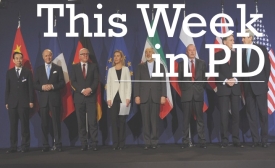nuclear talks

Will the Iran nuclear framework shape future international relations? This week PD News takes a look at the reactions to what may be an historic agreement.
For years, the United States and other nations have reached out to this population through broadcasting and online venues, but this process should be immediately expanded. Exchange programs – academic and cultural – are effective in breaking down stereotypes, and existing efforts should be accelerated.
Negotiators appeared to be moving wearily on Thursday toward a preliminary accord on limiting Iran’s nuclear program, but they remained at odds about how specific that agreement would be. Mohammad Javad Zarif, Iran’s foreign minister, suggested the accord would take the form of a general statement that he would issue publicly with Federica Mogherini, the European Union’s foreign policy chief.
Deal or no deal in the Iranian nuclear talks, Tehran is already behaving like it's made a killing. Sure, U.S. and international sanctions inflicted staggering damage on Iran's economy, convincing the longtime American foe to join talks aimed at limiting its nuclear program.
Nuclear talks between Iran and six world powers could continue right up to Tuesday’s deadline, U.S. officials said Sunday, as the two sides sought to hammer out the outlines of a final deal. The officials pointed to several unresolved issues in the negotiations, including the phasing of suspension and then lifting of United Nations Security Council sanctions on Iran, and the activities Tehran will be able to engage in during the final years of an agreement, which is now expected to last 15 years.
The world is watching for what could turn out to be either a historic achievement for international diplomacy -- or, just as easily, a disappointing failure -- as negotiators sit down this week in the tranquil lakeside city of Lausanne, Switzerland, to hammer out a framework nuclear deal with Iran before March 31.
Last week, the entire world watched the United States Congress giving the Prime Minister of Israel, Benjamin Netanyahu, a fervent round of applause with 26 standing ovations. While almost all major world powers criticize Netanyahu’s position against nuclear negotiations with Iran, the U.S. Congress embraced it with open arms. What message does this send to the rest of the world?
The chemistry between Netanyahu and Obama has never been good. It’s not a matter of personalities. It’s a clash of realities—the two men see the world differently. Obama believes the best way to protect Israel—and broader American interests—is to get a deal that will curtail Iran’s uranium enrichment, cut its stockpile of fuel, convert its facilities, and require intrusive daily inspections.







